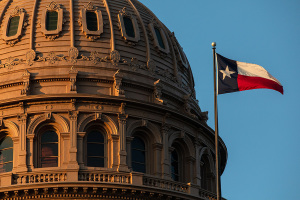Decline of Liberalism Began With Fiscal Cliff, George Will Says
The law passed by Congress to avoid the "fiscal cliff" represents the beginning of a decline for liberalism in America, conservative Washington Post columnist George Will believes.
"I think people will look back on this deal as where liberalism passed an apogee and went into decline," Will said Sunday in a panel discussion on ABC's "This Week."
The reason, Will explained, is that Democrats supported making the Bush-era tax cuts in the fiscal cliff bill for all but the wealthiest Americans, but liberalism requires high taxes on the middle class in order to have the expensive government programs that liberals prefer.
The fiscal cliff bill, called the "American Taxpayer Relief Act of 2012," was passed by Congress last Wednesday and was signed by President Barack Obama. It made the Bush-era tax cuts permanent for all income below $400,000 for individuals or $450,000 for couples. It also kept many tax deductions in place and delayed the automatic spending cuts for two months. There was no "grand bargain" on tax reform and entitlement reform to reduce deficits in the long term, as many had hoped for.
For the tax cuts passed under President George W. Bush in 2001, Will said, only 28 Democratic House members voted in favor, and in the tax cuts passed in 2003 only seven House Democrats voted in favor. But in the fiscal cliff bill, "172 Democrats voted to make the Bush rates permanent," Will explained.
"We have here an endangered species," Will said as he pointed to his right at Robert Reich, a liberal economist who served as Secretary of Labor under President Bill Clinton and is currently chancellor's professor of public policy at the University of California at Berkeley. Reich is one of "about three liberals in the country that aren't actively hostile to arithmetic," Will joked, "and, therefore, you know that you cannot fund the state that you want, the entitlement state, without taxing the middle class, at least, and now ... that's off the table."
After chuckling at Will, Reich answered that the problem with the fiscal cliff law is that it does not provide any of the three things that are most needed: a short term stimulus, long term deficit reduction, and some stability and certainty about the future.
"We have not dealt, really, at all with the ... long term deficit problem," Reich continued, but the main issue that needs to be dealt with in the short term is the high rate of unemployment.
The reason the United States has a deficit problem, Will said, is a broad consensus, shared by Democrats and Republicans alike, that "we should have a large, generous welfare state and not pay for it." And, this problem was illustrated by the fiscal cliff bill because Congress and the president prevented tax increases without cutting spending on entitlement programs.
Will made a similar point in a Wednesday editorial called, "Our decadent democracy." The U.S. government used to borrow money to invest in future generations, Will explained, such as infrastructure and winning wars, but government borrowing now "burdens future generations in order to finance current consumption." "Conscripting the wealth of future generations" is immoral, Will insisted.




























